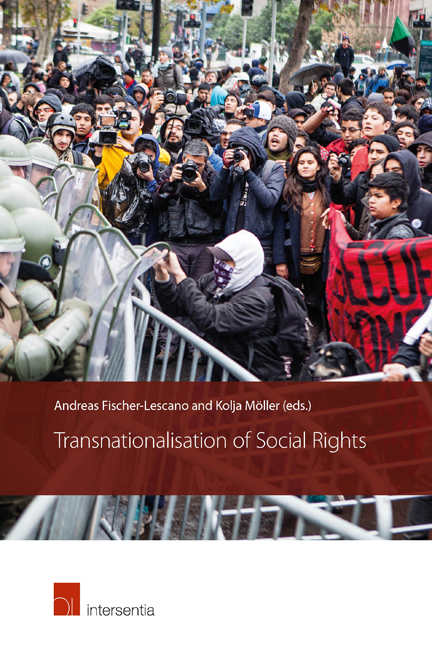Book contents
- Frontmatter
- Contents
- List of Contributors
- List of Abbreviations
- Chapter 1 Introduction
- PART I TRANSNATIONAL SOCIAL RIGHTS IN CONTEXT
- PART II FOUNDATIONS, INSTITUTIONS AND ENFORCEMENT STRUCTURES
- PART III ENFORCEMENT OF TRANSNATIONAL SOCIAL RIGHTS
- Chapter 8 Transnational Socio-Economic Rights: Inter-Linkages in the Context of the Right to Food
- Chapter 9 Agroenergy and the Right to Food: The EU Biofuel Mandate and Transnational Social Rights
- Chapter 10 Between Rights and Power Asymmetries: Contemporary Struggles for Land in Brazil and Colombia
- Chapter 11 The Zapatista Struggle for the Right to Land: Background, Context and Strategies
- Index
Chapter 8 - Transnational Socio-Economic Rights: Inter-Linkages in the Context of the Right to Food
from PART III - ENFORCEMENT OF TRANSNATIONAL SOCIAL RIGHTS
Published online by Cambridge University Press: 12 December 2017
- Frontmatter
- Contents
- List of Contributors
- List of Abbreviations
- Chapter 1 Introduction
- PART I TRANSNATIONAL SOCIAL RIGHTS IN CONTEXT
- PART II FOUNDATIONS, INSTITUTIONS AND ENFORCEMENT STRUCTURES
- PART III ENFORCEMENT OF TRANSNATIONAL SOCIAL RIGHTS
- Chapter 8 Transnational Socio-Economic Rights: Inter-Linkages in the Context of the Right to Food
- Chapter 9 Agroenergy and the Right to Food: The EU Biofuel Mandate and Transnational Social Rights
- Chapter 10 Between Rights and Power Asymmetries: Contemporary Struggles for Land in Brazil and Colombia
- Chapter 11 The Zapatista Struggle for the Right to Land: Background, Context and Strategies
- Index
Summary
INTRODUCTION – WHAT IS MEANT BY THE ” RIGHT TO FOOD” AND WHY FOCUS ON IT?
A substantial body of international law, not all of it well known, already exists in relation to the right to food. “International law” is taken here to incorporate both “hard” law, enshrined in treaties that normally create binding obligations on states when they ratify them, and “soft “ law, i.e., non-binding instruments that provide guidance and usually reflect expertise and political will. This chapter recalls the classical framework surrounding the right to food, enshrined above all in the International Covenant on Economic, Social and Cultural Rights, while highlighting linkages to lesser known sources, particularly in relation to labour and gender issues. It is situated within a much larger discussion around transnational legal norms, which are “dynamic, multi-layered and complex”. The right to food concerns both consumers and all those involved in food production and distribution. While inter-connections exist among various international social rights, these linkages could be much better exploited to strengthen more effective action in relation to the right to food.
Although the focus here is largely positivist, looking at norms generated through primarily inter-governmental processes, non-state actors have obviously played a critical role in shaping and vindicating the right to food. The launch in 2013 of the Global Network for the Right to Food and Nutrition, which brought together numerous NGOs and social movements long active in the field, marked a milestone in strengthening joint action. The growing phenomenon of private norm creation is also important and oft en intersects with public international law standards. How international organisations, states, enterprises, civil society groups and individuals use various legal norms in practice shapes international social law relating to the right to food. Particularly since the nomination by a UN Secretary General of a Special Rapporteur on the Right to Food, both awareness and understanding of the right to food have increased considerably.
As part of transnational law, which recalls the contested character, constituencies and communities of law, the right to food displays elements of both traditional international law and counter-hegemonic challenges to it.
- Type
- Chapter
- Information
- Transnationalisation of Social Rights , pp. 177 - 208Publisher: IntersentiaPrint publication year: 2016



